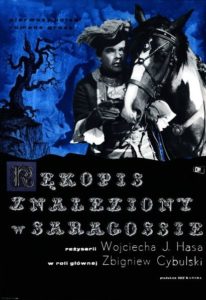A film that, according to Shock Cinema magazine’s Steven Puchalski, “Will undoubtedly send most viewers screaming for the exits, in search of the nearest Sonny Chiba film.” That’s probably true. A Polish art film made in 1965 and barely distributed stateside, THE SARAGOSSA MANUSCRIPT (REKOPIS ZNALEZIONY W SARAGOSSIE) has turned up in its uncut three-hour version (courtesy of Francis Ford Coppola and Martin Scorsese). Possibly the farthest the screen has ever taken the ARABIAN NIGHTS story-within-a-story motif, this distinctly literary exercise is not a film for the uncommitted or casual viewer. It’s a flawed, yet undeniably thought-provoking and sumptuous work.
“Will undoubtedly send most viewers screaming for the exits, in search of the nearest Sonny Chiba film.”
Special mention must be made of Mieczyslaw Jahoda‘s impressive b/w photography. The film is a visual feast from start to finish. The widescreen compositions are stunning and the atmospheric photography is even more so. Hard, gritty, and yet appropriately dreamy, Jahoda’s work vividly brings the film’s abundance of surreal gothic imagery to life. At its best, it’s a veritable symphony of light and shadow (at its worst, it’s just murky). As befits the film’s subject matter, the visuals create a universe of their own, as demanding, exhausting, yet ultimately rewarding as the film itself.
…the visuals create a universe of their own, as demanding, exhausting, yet ultimately rewarding as the film itself.
Based on a famous French novel by Count Jan Potocki (published in 1813, although it took until 1996 for a complete version to appear in English), THE SARAGOSSA MANUSCRIPT opens with a soldier finding an old book in the midst of an ongoing battle. The book tells of a young captain traveling through Spain where just about everyone he meets shares a story. Those stories often contain supernatural elements including ghosts, Satanic pacts, dire prophecies, pre NIGHT OF THE LIVING DEAD flesh-gnashing zombies, and two Tunisian sister-witches who make several appearances. The characters within each story also have a passion for storytelling, as do the characters in each of their stories, until the recursive individual tales eventually parallel, extend or just fill in the blanks of one another. It all adds up to what can only be described as an intellectual crossword puzzle.
A major scene toward the end of THE SARAGOSSA MANUSCRIPT has a group of characters attempting to sort out the impossibly convoluted narrative they find themselves trapped inside—it’s that confusing. Further complicating matters is a recurring motif where the hero awakens under a gallows tree, realizes that the preceding events have all been a dream, and, sure enough, finds himself waking up under that same gallows tree again and again…
Those stories often contain supernatural elements including ghosts, Satanic pacts, dire prophecies, pre NIGHT OF THE LIVING DEAD flesh-gnashing zombies, and two Tunisian sister-witches…
Director Wojciech Has (THE HOURGLASS SANITORIUM, MEMOIRS OF A SINNER), certainly deserves points for ambition. The film has a truly giant cast of characters, boasting at least a dozen speaking parts. Yet it still manages to stay afloat, perhaps because of Has’s witty, rather playful tone. In addition, his gift for composition is evident throughout.
Unfortunately, Has remains deficient in an important area—that of storytelling. Even without the ARABIAN NIGHTS motif, the film is plenty confusing. The problem may be Has’ obvious fidelity and respect for the original novel. Amusing though THE SARAGOSSA MANUSCRIPT is, nearly every scene cries out that this is a literary adaptation. Thus, in spite of the adventurous and often horrific goings-on, this film often feels more like a history lesson than a swashbuckler.
See Also:
On THE DUCHESS OF AVILA;
The Story of Rebecca
Vital Statistics
THE SARAGOSSA MANUSCRIPT (REKOPIS ZNALEZIONY W SARAGOSSIE)
POLart
Director: Wojciech Has
Producer: The Polish Corporation for Film Production
Screenplay: Jerzy Skarzynski, Tadeusz Myszorek
(Based on a novel by Count Jan Potocki)
Cinematographer: Mieczyslaw Jahoda
Cast: Zbigniew Cybulski, Iga Cembrzynska, Joanna Jedryka, Kazimierz Opalinski

